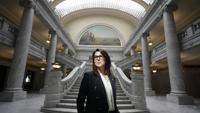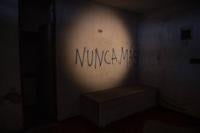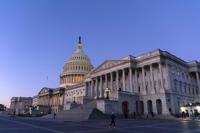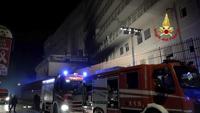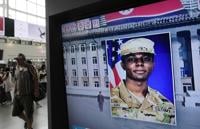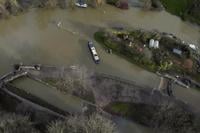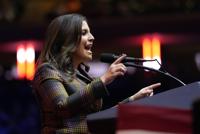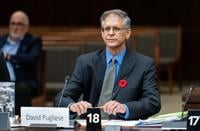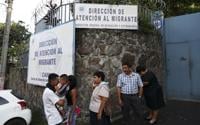ATLANTA (AP) — It was Election Day last November, and one of Georgia’s top election officials saw that reports of a voting machine problem in an eastern Pennsylvania county were gaining traction online.
So Gabriel Sterling, a Republican who had defended the 2020 election in Georgia amid , posted a message to his nearly 71,000 followers on the social platform X explaining what had happened and saying that all votes would be counted correctly.
He faced immediate criticism from one commenter about why he was weighing in on another state’s election while other responses reiterated about widespread fraud in the .
“It’s still the right thing to do,” Sterling told a gathering the following day, stressing the importance of Republican officials speaking up to defend elections. “We have to be prepared to say over and over again -- other states are doing it different than us, but they are not cheating.”
Sterling, the chief operating officer for the Georgia Secretary of State’s Office, is part of an effort begun after the last presidential election that seeks to bring together Republican officials who are willing to defend the country's election systems and the people who run them. They want officials to reinforce the message that elections are secure and accurate, an approach they say is especially important as the country heads toward another divisive presidential contest.
The group has held meetings in several states, with more planned before the Nov. 5 election.
With six months to go before the likely rematch between Democratic President Joe Biden and former Republican concerns are running high among election officials that public distrust of voting and ballot counting persists, particularly . Trump, the presumptive GOP nominee, continues to sow doubts about and is warning his followers — without citing any evidence — that Democrats will try to cheat in the upcoming one.
This past week, during a campaign rally in Michigan, Trump repeated his false claim that Democrats rigged the 2020 election. “But we’re not going to allow them to rig the presidential election,” he said.
Just expressed high confidence that votes will be counted accurately in November, according to an Associated Press-NORC Center for Public Affairs Research poll last year.
“It’s an obligation on Republicans' part to stand up for the defense of our system because our party -- there’s some blame for where we stand right now,” said Kentucky's secretary of state, Michael Adams, who is part of the group and won reelection last year. “But it’s also strategically wise for Republicans to say, ‘Hey Republicans, you can trust this. Don’t stay at home.’"
The effort, which began about 18 months ago, is coordinated by the SNF Agora Institute at Johns Hopkins University and the center-right think tank R Street Institute. The goal has been to start conversations about trust in elections, primarily among conservative officials, and to develop a set of principles to accomplish that.
“This has never been and will never be about Trump specifically,” said Matt Germer, director of governance for the R Street Institute and a lead organizer of the effort. “It’s about democratic principles at a higher level –- what does it mean to be a conservative who believes in democracy, the rule of law?"
He said an aim is to have a structure in place to support election officials who might find themselves in situations like that of Georgia' secretary of state, Brad Raffensperger in 2020, when he supported Trump but rejected . Prosecutors in Georgia have since , alleging a plot to overturn the results. Trump has pleaded not guilty.
“You can be a Republican and you can believe in all the Republican ideas without having to say the election was stolen,” Germer said.
A guiding principle for the group is that Republican officials should “publicly affirm the security and integrity of elections across the U.S. and avoid actively fueling doubt about elections in other jurisdictions.”
, a Republican who previously served as Washington state’s top election official, said it’s imperative when officials are confronted with somewhere else that they don’t avoid the question by promoting election procedures in their own state.
It's OK to say you don’t know the various laws and procedures in another state, Wyman said, but she urged fellow Republicans to emphasize what states do have in common -- "the security measures, the control measures to make sure the election is being conducted with integrity.”
Kansas' secretary of state, Scott Schwab, a Republican who has participated in meetings organized by the group, said he believes there are certain aspects of elections that officials should feel comfortable talking about. But he said he would remain cautious of speaking directly about something specific happening in another state.
“If I start going beyond my realm and my role, then they don’t trust me. And if they don’t trust me, then they don’t trust the elections in Kansas, and that’s pretty important,” Schwab said in an interview.
Some election officials who have questioned election procedures outside their state have a different perspective.
Secretary of State Mac Warner of West Virginia, a Republican of the 2020 election, said the focus should be on improving policies, such as putting in place voter ID requirements across the country, not silencing those who have questions.
“Our primary job as election officials is to build confidence, and that comes from strengthening protocols and not weakening them,” he said.
Ohio Secretary of State , a Republican about the way elections are run in other states, criticized what he called “activist lawsuits” and state officials who seek to change voting rules previously set by legislators.
“The things that happen in other states that go wrong are not the result of some cloak and dagger, secretive cabal conspiracy,” he said in an interview. “That’s the far-fetched stuff that makes for great YouTube videos and what have you. But the real things that go wrong in other states, are out in the open, are in full public view.”
Utah , a Republican who is the state’s top election official and has been participating in the group's discussions, said avoiding criticism of other states and vouching for the legitimacy of election procedures is important for another reason: It can help reduce the threats and harassment directed toward election workers.
A recent survey by the Brennan Center for Justice at New York University's Law School found that nearly 40% of local election officials had experienced such abuse. It's caused many to leave their jobs. Of 29 clerks in Utah, Henderson said 20 are new since 2020 and nine have never overseen an election.
“It’s one thing to suggest that someone could do something better. It’s another thing to impugn their integrity, their character, accuse them of cheating, accuse them of nefarious things that don’t happen,” Henderson said. “It’s exhausting.”
___
Associated Press writer Julie Carr Smyth in Columbus, Ohio, contributed to this report.


